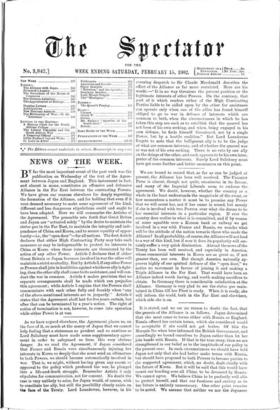NEWS OF THE WEEK.
BY far the most important event of the past week was the publication on Wednesday of the text of the Agree- ment between Japan and England. This instrument in fact, and almost in name, constitutes an offensive and defensive Alliance in the Far Edst between the contracting Powers. We have given our' reasons elsewhere for deeply regretting the formation of the Alliance, and for holding that even if it were deemed necessary to make some agreement of the kind, different and less dangerous stipulations could and ought to have been adopted. Here we will summarise the Articles of the Agreement. The preamble sets forth that Great Britan and Japan are " actuated solely " by the desire to maintain the status quo in the Far East, to maintain the integrity and inde- pendence of China and Korea, and to secure equality of oppor- tunity—i.e., the "open door "—for all nations. The first Article declares that either High Contracting Party may take such measures as may be indispensable to protect its interests in China or Korea when those interests are threatened by the action of any other Power. Article 2 declares that if either Great Britain or Japan becomes involved in war the other will maintain a strict neutrality. But by Article 3, if any other Power or Powers shall join in hostilities against whichever ally is fight- ing, then the other ally shall come to its assistance, and will con- duct the war in common. Article 4 makes provision that no separate arrangements shall be made which can prejudice this agreement; while Article 5 enjoins that the Powers shall communicate with each' other fully and frankly when "any of the above-mentioned interests are in jeopardy." Article 6 states that the Agreement shall last for five years certain, but after that can be terminated by a year's notice. The right of notice of termination is not, however, to come into operation while either Power is at war.






































